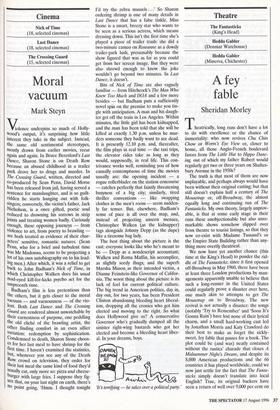Cinema
Nick of Time (18, selected cinemas) Last Dance (18, selected cinemas) The Crossing Guard (15, selected cinemas)
Moral vacuum
Mark Steyn
Volence underpins so much of Holly- wood's output, it's surprising how little interest they take in the subject. Instead, the same old sentimental stereotypes, mostly drawn from earlier movies, recur again and again. In Bruce Beresford's Last Dance, Sharon Stone is on Death Row because an abused childhood in a trailer park drove her to drugs and murder. In The Crossing Guard, written, directed and co-produced by Sean Penn, David Morse has been released from jail, having served a sentence for manslaughter, and is so guilt- ridden he starts hanging out with folk- singers; conversely, the victim's father, Jack Nicholson, is a once gifted, poetic soul reduced to drowning his sorrows in strip Joints and treating women badly. Curiously enough, these opposing journeys — from violence to art, from poetry to brawling are both treated as evidence of their char- acters' sensitive, romantic natures. (Sean Penn, who for a brief and turbulent time was Mr Madonna, seems to be projecting a lot of his own autobiography on to his lead- ing men.) After which, it was a relief to get back to John Badham's Nick of Time, in which Christopher Walken does his usual mad-eyed kill-for-kicks psycho act for the umpteenth time.
Badham's film is less pretentious than the others, but it gets closer to the moral vacuum — and vacuousness — of the vio- lent. Both Last Dance and The Crossing Guard are rendered almost unwatchable by their earnestness of purpose, one peddling the old cliche of the brawling artist, the other finding comfort in an even sillier variation: redemption by sophistication. Condemned to death, Sharon Stone choos- es for her last meal to have shrimp for the rust time. I haven't examined the statistics, but, whenever you see any of the Death Row crowd on television, they order for their last meal the same kind of food they'd Usually eat, only more so: pizza and cheese- burger with large fries. I suppose they fig- ure that, on your last night on earth, there's no point going, 'Hmm. I thought tonight I'd try the zebra mussels ...' So Sharon ordering shrimp is one of many details in Last Dance that has a false tinkle. Miss Stone is a smart, breezy star who wants to be seen as a serious actress, which means dressing down. This isn't the first time she's played a piece of trailer trash: she did a two-minute cameo on Roseanne as a dowdy trailer-park lush, presumably because the show figured that was as far as you could get from her screen image. But they were also shrewd enough to know the joke wouldn't go beyond two minutes. In Last Dance, it doesn't.
Bits of Nick of Time are also vaguely familiar — from Hitchcock's The Man Who Knew Too Much and DOA and a few more besides — but Badham puts a sufficiently novel spin on the premise to make you tin- gle with anticipation. A man and his daugh- ter get off the train in Los Angeles. Within minutes, the little girl has been kidnapped, and the man has been told that she will be killed at exactly 1.30 p.m. unless he mur- ders someone they badly want to see dead. It is presently 12.10 p.m. and, thereafter, the film plays in real time — the taxi trips, the elevator rides take as long as they would, supposedly, in real life. This con- trivance works well, reminding you of how casually contemptuous of time the movies usually are: the opening incident — a rogue rollerblader on the station concourse — catches perfectly that faintly threatening busyness of a big city; similarly, tired thriller conventions — like swapping clothes in the men's room — seem sudden- ly far tenser. But, elsewhere, Badham's sense of pace is all over the map, and, instead of projecting unseen menace, Christopher Walken (as the kidnapper) tags alongside Johnny Depp (as the dupe) like a tiresome bag lady.
The best thing about the picture is the cast: everyone looks like who he's meant to be — Depp as a nondescript accountant; Walken and Roma Maffin, his accomplice, as slightly seedy thugs; and the superb Marsha Mason as their intended victim, a Dianne Feinstein-like Governor of Califor- nia. The worst thing about the picture is its lack of feel for current political culture. The big trend in American politics, day in, day out, for two years, has been President Clinton abandoning bleeding heart liberal- ism, dropping all the cronies who got him elected and moving to the right. So what does Hollywood give us? A conservative Governor who's gradually dumped all the sinister right-wing bastards who got her elected and become a bleeding heart liber- al. In your dreams, boys.
's terrifying — he takes over a political party.'


















































 Previous page
Previous page